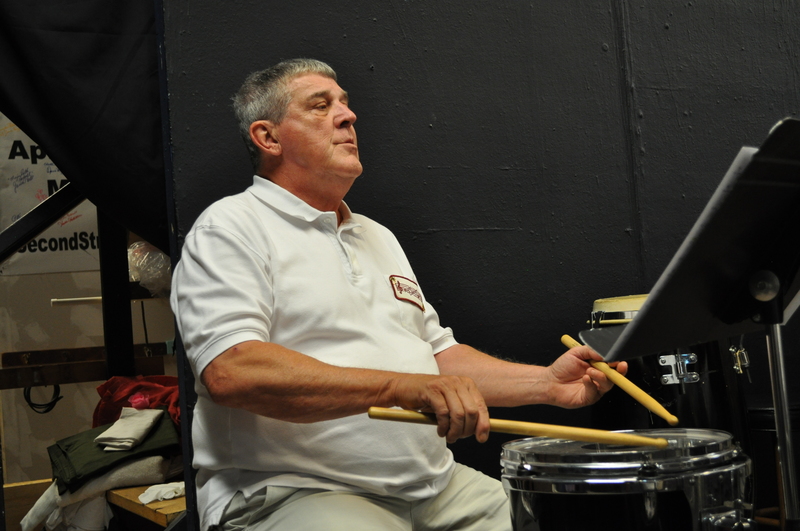For Dr. Gerald Thompson, newly named manager of the Milford Community Band, replacing MCB Founder Joe Lear, it’s always been about listening. As a child he developed an ear for music, able to play back music from memory. “I enjoy listening to music,” said Thompson. “I follow a melody line much like riding a roller-coaster with harmonic progressions acting as the curves and finally the percussive sounds the movement the car makes. I’m always listening and learning.”
Although Thompson had a gift for piano, he gave it up to pursue sports. In high school, he returned to music, playing clarinet in the school band and drums in a rock band. “It was mostly Elvis Presley, Buddy Holly, the Ventures and anything that was playing on the radio,” he said. “One day the drummer in a popular Dover band quit because his dad was being transferred. I had a drum set and got the gig.”
Next stop Vietnam
He was playing music and having a good time when Vietnam called. He was influenced by the Barry Sandler song “The Ballad of the Green Berets’” and by President Kennedy’s challenge, “Ask not what your country can do for you, but what you can do for your country.” “I didn’t know where Vietnam was, I was so naïve,” he said. His assignment was to find the enemy and call in the proper coordinates.
Once discharged, he was returning to Philadelphia by plane when he struck up a conversation with a pretty United Airlines flight attendant named Colleen. She was the first American girl he had talked to in two years, and he was smitten. She was equally impressed with his uniform and medals, and they made plans to go on a date. Six months later they married. They celebrated their 45th wedding anniversary this year. They have two daughters, Gretchen and Shannon.
A day after arriving home from the war, Thompson was standing in line to register for school at Wesley College in Dover. “When the advisor asked what I wanted to major in I was confused. I really didn’t think about it. He asked me about hobbies or interests. I told him I played drums in a band and he said I was a music major. I was kind of in a fog that first semester. Lucky for me, the chairman of the music department understood what I was going through and got me through that first semester. Then he sat me down and told me if I didn’t straighten out I would flunk out of school. I buckled down and got my degree in music education.” He would later get his master's in percussion and his Ed.D in education.
The kids are all right
Thompson landed the job as band director at Milford High School in 1972. “Coming out of the Army, I could teach marching. I would hang out in the cafeteria and listen to the students’ conversations and see who liked music. We went from 15 kids to 30 to 55 and kept building. We got new uniforms, which helped. On the field we played rock music instead of the traditional marches, which the kids liked. And people in the stands also wanted more contemporary music, like Blood Sweat and Tears, and Chicago. When you kicked out a Chicago tune, everyone got into it,” he said.
“The kids thought I was insane,” he continued. “I used humor a lot and many didn’t know how to take me. I noticed high school kids didn’t laugh a lot for whatever reasons so I tried to loosen them up with humor. Band class was usually the seventh period so by the time they came in they had already been through six other classes and they had a lot of stress. Someone would be crying because they only got a 97 on their test. So when they came into my class, I wanted to change that environment.”
Thompson was band director for 30 years at Milford and another five at North Caroline High School in Denton, Md. “I was always close to the drummers,” he said. “And they hated me because I was so demanding,” he added with a laugh. “I wanted them to do it the right way. But when they nailed the program on game day, the look on their faces when they came off the field told me all the work had paid off.”
His bands performed at football games, parades and festivals up and down the East Coast. They marched in the Bicentennial in Philadelphia. And his duties as director included more than music. He also had to be part MacGyver. “You developed all types of gadgets to make players better,” he said. “You would bend coat hangers to keep a kid’s fingers from rising too high off of the keys. You always had duct tape to repair instruments. I carried bubblegum and rubber bands - whatever you needed to fix the equipment.”
Some of his favorite students were those who had to work harder to play. “Some of my best musicians were special needs kids,” he remembered. “I had one drummer who was learning at a third-grade level. But he excelled at drums because it offered him a different approach. He excelled because the drums are hands on. He took it on as an individual challenge, and he was doing it for himself.”
Thompson also believes that music offers kids some lessons they wouldn’t normally be getting in this age of social media and personal computers. “Music gives kids discipline. It gives them organization. It gives them coordination and exercise. It gives them aesthetics or exposure and appreciation of the arts and life, instead of just learning about core subjects.”
Replacing a legend
Thompson and Lear have a long history. Back in 1990, Lear was helping Thompson with the high school band when he complained that he didn’t have anywhere to play his horn. Thompson suggested he start his own band. In 2015, the Milford Community Band will celebrate its 25-year anniversary.
“Joe Lear wrote the book on organizational techniques,” said Thompson of his friend and mentor. “There’s always a paper trail with Joe. It’s all on paper and followed to the `t’. He is a great role model and shows me a better way to handle situations.”
Thompson has plans to take the MCB to the next level. “I’d like to see a performance level increase. This is a very good semi-pro music program. Yet, the program welcomes younger players and those players whose horns have been in the closet for the past few years. We’re constantly getting musicians from different backgrounds. I’d like to add a few more ensembles to our current list: Downtown Dixieland Band, The Smooth Sound Dance Band, The Happy Wanderers Oompah Band, The Kettle Drummers, etc."
Thompson, who cites drummers Buddy Rich and Joe Morella as his influences, will take a special interest with his group of percussionists. “Good drummers have a knowledge of the music. They give control to the arrangement. The slightest change in percussion can add to or delete from the piece.”
Thompson would also like to partner with the Delaware Music School to add strings to the MCB’s sound. Also, because the MCB would like to attract younger audiences, he wants to find ways to attract younger crowds. “We give scholarships to kids and we have kids in the band. In what other organization can a young person sit next to an older person who is better than them and learn from them?” he said.

















































